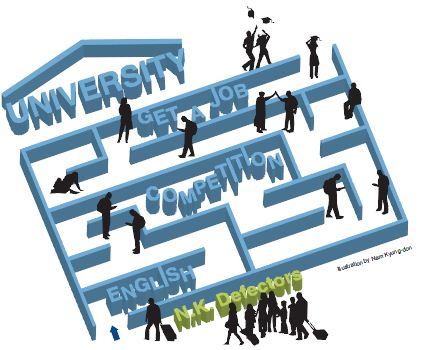Resettlers hope to play role of ‘bridge’ between two Koreas, contribute to reunificationOne of the challenges facing young North Korean defectors here is that people at large define their identities based on the negative image of the communist state ― poor, uncultured, repressive and isolated.
Competing with better educated, well-fed South Korean classmates is another that many of them think is insurmountable. But they feel happy because of the long-cherished freedom they have won.
Kang Timothy, a 25-year-old communications major at Konkuk University, is grateful for his freedom of speech and assembly and other rights. But he has had his own share of tribulations while adapting to his new life here.
“Exams in my classes are graded on a curve, meaning I have to perform better than others to score high. But when professors talked about things like Aristotle, Plato or Shakespeare I never heard of in the North, I just had no idea,” said Kang.
“During an English class, I thought I was relatively good at English considering I had talked with foreigners at my church on several occasions. But I got an F, though it was later upgraded to D plus. It was quite a shock to me.”
Kang said although there was a state educational program in the North, many struggling with hunger could not benefit from it. “I was dragged into school, but couldn’t see and hear things well ― symptoms of serious starvation,” Kang bitterly recalled.
Kang came to South Korea alone in 2008 after fleeing the North in 1998 and living in China for some 10 years.
On top of such an academic gap, school-age defectors have found it difficult to transition to a different culture that promotes creativity, personal opinion and equal opportunities.
“I was raised in a repressive culture where there were no personal opinions and people just did what they were told to do. But here, people keep asking me to share my thoughts and ideas during collaborative school work,” said Lee Ye-eun, a 19-year-old business administration major at Konkuk University.
“I mostly stay tight-lipped during discussions with my classmates, who might think of me as sort of strange. Even now, I tend to just accept and absorb what is written in books (rather than being critical of any part of them).”
She added that she now keeps saying to herself, “My competitor is my own self,” as part of efforts to overcome the reality that her friends are far ahead on most of the school subjects.
Lee arrived here in 2007 with her mother after crossing the border with China in 2004.
What may be most challenging for defectors is that their peers define their identities in light of what Pyongyang was upbraided for ― starving its people while pursuing expensive nuclear programs and launching provocations against the South.
“I went to an ordinary elementary school here. After everybody became aware I was from the North, everybody looked at me differently. Whatever I did, they said it was because I was a North Korean defector,” said Cha Hye-young, a 20-year-old business administration major at the same university.
Cha came here with her entire family in 2003 after crossing the border into China in 1997.
Lee also shared a similar experience of her peers putting her in the “stereotypical frame” of North Koreans.
“They looked at me as if I were a beggar. They asked me if I was making nukes and starving. They also looked at me with pitiful eyes although I and my mother were happily living here. That really hurt my pride,” said Lee.
As young defectors often face such embarrassing situations, they sometimes do not speak about their origin. But this, in many cases, forces them to pretend to know about things they actually don’t.
“If we don’t talk about our North Korean origin, we are treated equally. But the moment you speak about it, people put you in the stereotypical frame,” said Kang.
“Thus I once got by without saying I was a defector. But I had to keep lying to myself while pretending to know what South Koreans know. This was really frustrating to me. Later on, I just said that I was from across the border because I was too distressed to (keep hiding my identity).”
Despite such challenges, the young defectors said that they are thankful for all they never imagined in their hometowns.
“Those who were liberated from all the fetters, like us, can really feel the genuine freedom here. Making public speeches and participating in a rally to save North Korean defectors held in China and facing repatriation ― all this was inconceivable there,” said Kang.
Young defectors now dream of playing a role as a “bridge” between people of the two Koreas to help pave the way toward national reunification.
“I hope that the reunification will not occur without sufficient preparation. I am not saying that there should be any big, showy preparations, but we should first enhance mutual understanding. For that, we have a crucial role to play,” said Lee.
More than 23,200 North Koreans have defected here since the 1950-53 Korean War.
The number of defectors steadily increased annually from 2005 until 2009 ― 1,383 in 2005, 2,018 in 2006, 2,544 in 2007, 2,809 in 2008 and 2,927 in 2009, according to the Unification Ministry.
It then dropped to 2,379 in 2010 when Pyongyang tightened its border control while preparing for its hereditary power succession. Last year, the figure rebounded to 2,737.
By Song Sang-ho (
sshluck@heraldcorp.com)

![[Exclusive] Korean military set to ban iPhones over 'security' concerns](http://res.heraldm.com/phpwas/restmb_idxmake.php?idx=645&simg=/content/image/2024/04/23/20240423050599_0.jpg&u=20240423183955)




![[Pressure points] Leggings in public: Fashion statement or social faux pas?](http://res.heraldm.com/phpwas/restmb_idxmake.php?idx=645&simg=/content/image/2024/04/23/20240423050669_0.jpg&u=)